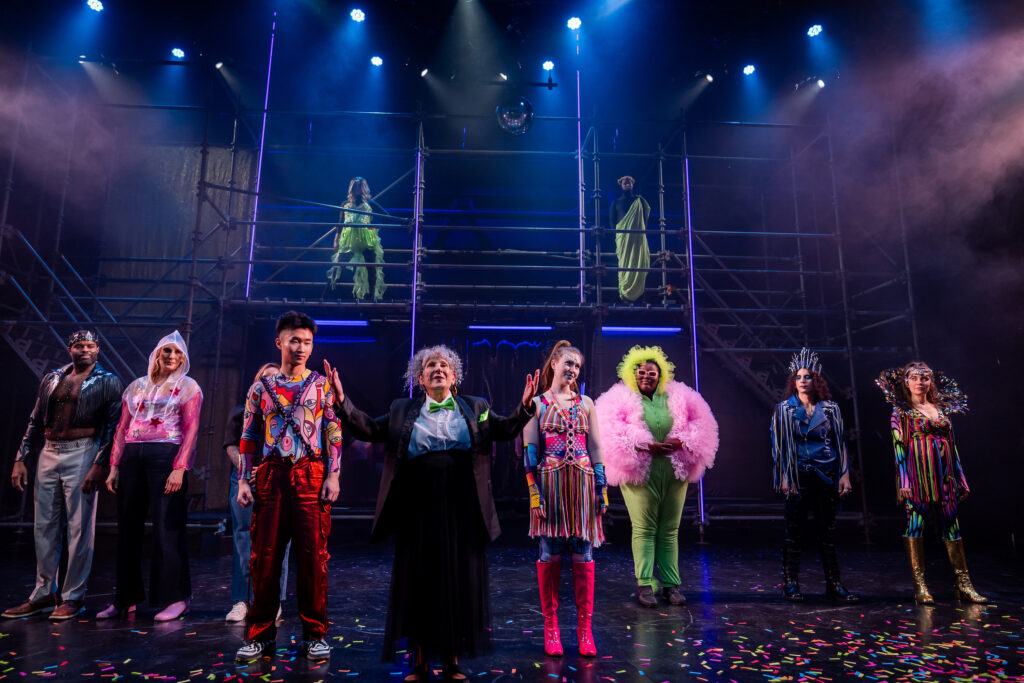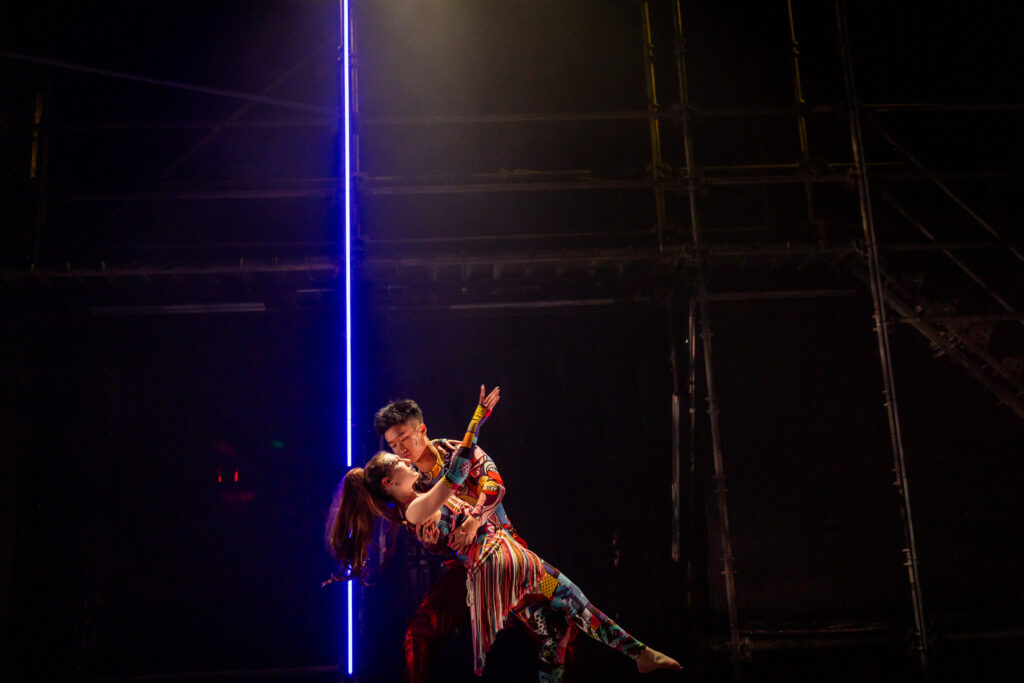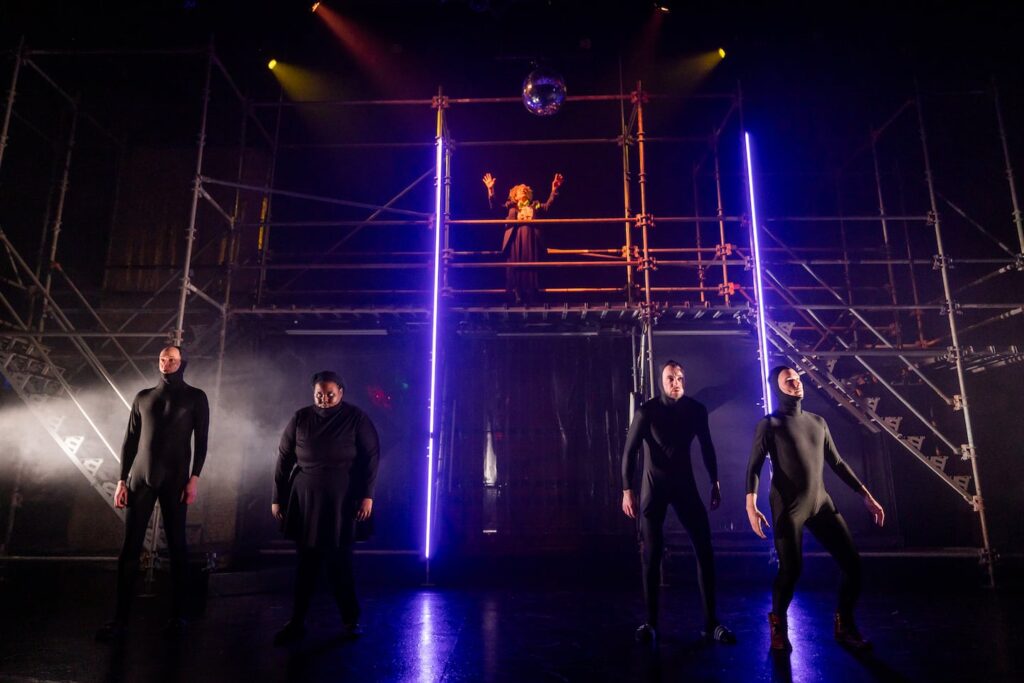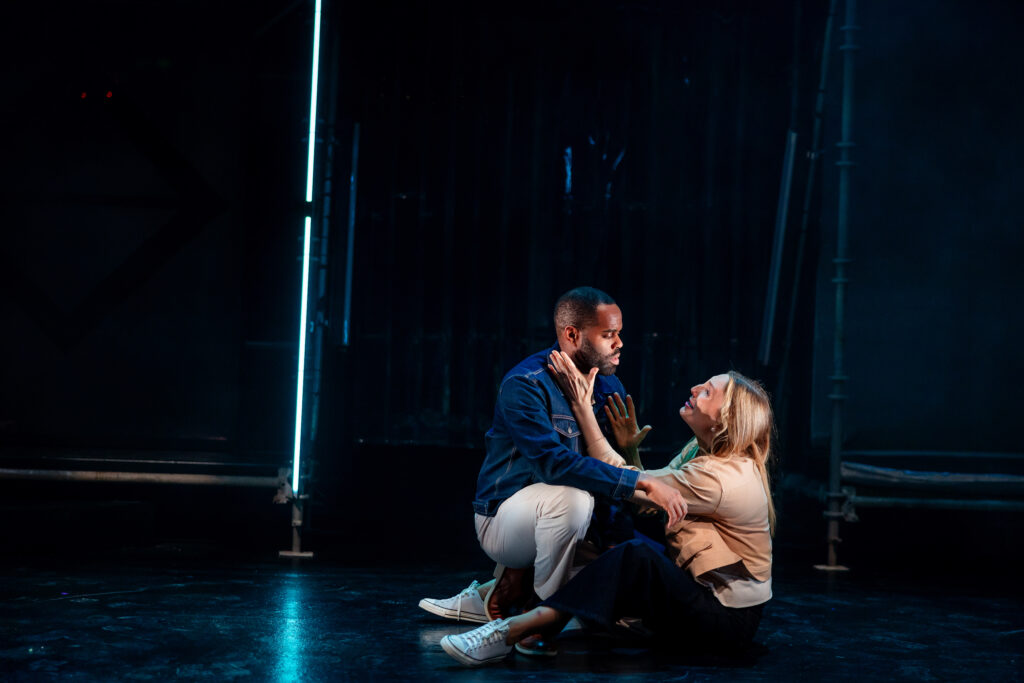
‘A Midsummer Night’s Dream.’ Written by William Shakespeare. Directed by Maurice Emmanuel Parent. Presented by Actors’ Shakespeare Project at Mosesian Center for the Arts, 321 Arsenal St., Watertown through May 4.
By Shelley A. Sackett
A Midsummer Night’s Dream is one of those plays that is firmly etched in most people’s long-term memory banks, whether as a first introduction to Shakespeare in high school or as one of scores of film and theatrical productions. There are countless riffs on the play, from the sci-fi A Midsummer Night’s Gene to recently produced The Donkey Dream. Even The Beatles got in on the act in their 1964 TV special, “Around the Beatles,” when they played the “Pyramus and Thisbe” section of the play to an audience of hecklers and moonstruck fans, especially appropriate for this comedy play within a play. (https://www.youtube.com/watch?v=SvREt_w_KOE )
So, director Maurice Emmanuel Parent set a lofty goal for himself when he decided to create a version that could stand out as uniquely his. Happily, he not only succeeds but raises the bar for the next director that proposes to make their mark on this well-represented classic. He brilliantly manages to leave his 21st-century fingerprints on an age-old classic while allowing room for the beauty of the original late 16th-century language to radiate.

Parent creates a mash-up universe where fairies inhabit “a space of freedom, fun, sex, danger, mystery, and transformation,” as he describes in his director’s notes. He envisions theirs as a world of clubs like the ones he frequented in New York in his late teens and early 20s. Think The Roxy, Palladium, and Tunnel, he suggests. “These were joyful, queer-positive spaces that offered refuge for many of us. But they were also dangerous.”
His fairy world is not full of sugar plums and pixie dust; it is a disco inferno on steroids, where glitter, leather, gyrating hips and lascivious tongues rule.
Humans inhabit a more “normal” place, but the simplest set and props (scenic design by Ben Lieberson, props by Christina Ostner), creative lighting (Brian Lilienthal), and 21st-century costumes (Seth Bodie) ensure it is not mundane. Kudos, too, to sound designer Mackenzie Adamick for crisp clarity and the actors for their enunciation; it’s always a pleasure not to have to strain to hear and/or understand what’s being said.

The beloved main plot revolves around three subplots: the romantic entanglement of four Athenian lovers, the conflict between the fairy king and queen, and a group of amateur actors preparing a play. These storylines intertwine, leading to humorous misunderstandings and ultimately a happy resolution of reconciliation and, for the humans, marriage.
The lovers’ romances are complicated but amusing. Hermia (the lively Thomika Marie Bridwell), in love with Lysander (Michael Broadhurst), is forced by her father, Egeus (the standout Bobbie Steinbach), to marry Demetrius (De’lon Grant, always a pleasure to watch). Helena (a show-stealing Deb Martin) is in love with Demetrius, who is in love with Hermia.
Hermia and Lysander decide to run away to the woods to elope, but are followed by Demetrius and Helena.
Meanwhile, all is not well in the parallel but very different world of the fairies. King Oberon (Dan Garcia, channeling Rocky Horror Picture Show’s Frank-N-Furter) and Titania (an elegantly lithe Eliza Fichter), his queen, are at odds over the fate of a changeling boy. Oberon, seeking a tit-for-tat revenge on Titania, gets the tricksy sprite, Puck (Alan Kuang, both carnal and ethereal), to use a love potion to make her fall in love with the first living thing she sees after waking. For sport, he also instructs Puck to use the same potion on the humans to manipulate their affections.
Adding spice to the mix is a group of Athenian artisans, or “mechanicals,” who are rehearsing the play “Pyramus and Thisbe,” which they hope will be picked as the entertainment for Duke Theseus (Kody Grasset) and Hippolyta’s (Fichter) wedding. Under the direction of Quince (Steinbach), the carpenter, the members of the troupe are: Snug, the joiner (Rémani Lizana); Bottom, the weaver (a superb Doug Lockwood); Flute, the bellows-mender (Evan Taylor); and Starveling, the tailor (Grassett). Their rehearsals and attempts to perform the play are filled with comical mishaps and misunderstandings.
The three plot vectors collide when Puck disrupts them all with his peevish mischief. He transforms Bottom’s head to that of a donkey and makes sure he is the first thing Titania sees upon awakening. He finds the four lovers asleep in the woods and applies the potion to Lysander and Demetrius, who both fall madly in love with Hermia.
Eventually, the potion is undone, and the lovers, with the help of Oberon, realize their true affections, and he and Titania are reconciled. “Pyramus and Thisbe,” to the audience’s delight, wins the contest to be the entertainment at the Duke and Hippolyta’s wedding, and all ends in merriment and mirth, both in the human and fairy worlds.

While the production is a hands-down blast full of singular moments and overall skillful acting, there are some outstanding performances that have to be spotlighted and applauded. As Helena, Martin brings the force of a hurricane and the delicacy of a ballerina. Her hand gestures alone are worth the price of admission. As Bottom, the conceited and clownish actor who milks every second of Titania’s infatuation, Lockwood mugs without exaggerating and commands the stage without seeming to. Steinbach is always a treat and this show is no exception. Last, but hardly least, is Kuang, who doesn’t just play Puck, but is Puck, albeit as a reimagined break-dancer, all wisecracks and tattoos. His spirit — and energy! — are palpable.
Parent sprinkles in a bunch of fleeting backhanded references (The Lion King, the Beatles’ “Blackbird,” and Lynda Carter’s Wonder Woman outfit) that are a hoot. His pacing, not rushing the Bard’s words, allows ample time for their meaning to percolate. This is, after all, one of Shakespeare’s funniest and cleverest plays, and even if you’ve seen it multiple times already — especially if you’ve seen it multiple times already — be sure not to miss this crackerjack version.
For more information, visit https://www.actorsshakespeareproject.org/plays-events/midsummer-2025/

